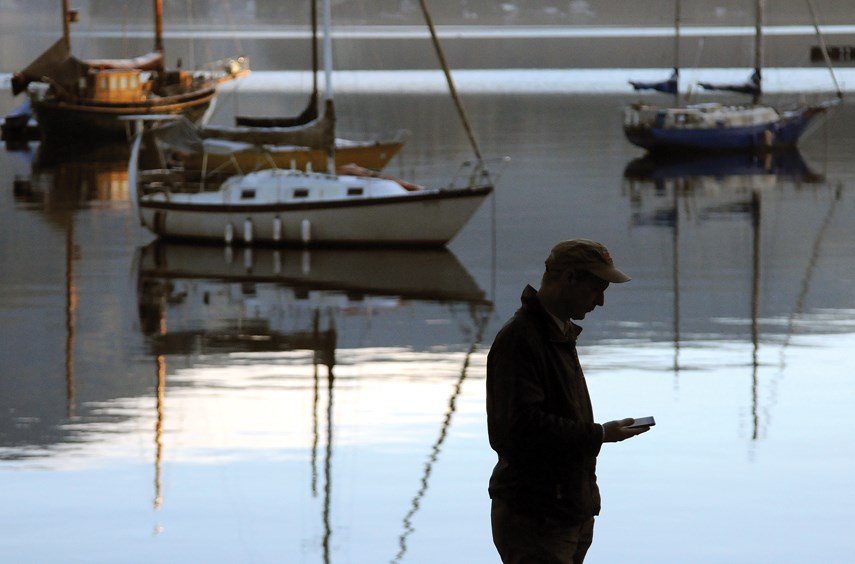While largely outnumbered by residents, live-aboard boaters came ashore Monday night – humanizing themselves in the face of criticism at a marine vessel town hall meeting in Deep Cove.
Cody Van’t Hullenaar lives on a 52-foot sailboat in the Cove with his young daughter who attends a local elementary school, his fiancée and her two children. Their floating home was spray-painted with the message “Leave” under the cover of night in September, 2018.
Van’t Hullenaar, a commercial diver, said there’s a lot of fear mongering circulating through the Cove about the live-aboards.
“Circa 1960 Mississippi, perhaps. When a community goes against a group of people without getting to know them – it’s a history that we are trying to get against.”
Homeowners whose properties ring the Cove shoreline packed Seycove Secondary’s library for the meeting held by Burnaby North-Seymour MP Terry Beech who dove into Bill C-64, the Wrecked, Abandoned or Hazardous Vessels Act, which will likely become law by March.
Beech, who is transport parliamentary secretary, discussed the federal government’s plan to fine those who abandon their vessel and to crack down on dilapidated boats. The act will also give marine patrol officers the ability to issue tickets.
“It’s going to address a lot of the concerns that have been raised over the last six months,” said Beech, “because the fact is we just haven’t had previously all the tools that we need to address some of these problems.”

Beech had senior representatives from Transport Canada and Vancouver Fraser Port Authority in tow with him Monday to answer questions. Enforcement of boating regulations dominated the discussion.
“You have no derelicts in Deep Cove,” senior harbour patrol officer Jason Krott told the residents.
What the Cove does have are a dozen or so “vessels of interest” that are anchored without authorization, four of which have been part of the landscape for 13 months, according to weekly counts done by Krott and his patrol staff.
The live-aboard population in Deep Cove increased after the City of Port Moody cracked down on illegally anchored boats in 2016. All boaters must now have a permit to stay overnight there.
Krott confirmed some boats in the Cove and Bedwell Bay, across Indian Arm, have migrated there from Port Moody.
“And that’s the nature of the problem. It’s these boats moving in and out – they know the game,” said Krott, adding vessels have the right to anchor for a reasonable period of time, under the Canada Marine Act.
“What’s a reasonable time?” one resident piped up, only to be told there was no definition.
While Krott has made contact with “vessels of interest” in the Cove, they don’t meet the criteria for towing because they aren’t a hazard to navigation, or polluting the environment.
“If I’m going to take a vessel, I have to be 100 per cent sure that I’m right. That I’m not trampling on somebody’s human rights,” said Krott, adding it’s a complex issue.
Port Moody’s solution of managing their own anchorage, through a leased water lot from the Port, could be an option in Deep Cove, said Duncan Wilson, the Port’s vice-president of corporate social responsibility.
Concerns raised at the meeting included whether or not the live-aboards have liability insurance, the lack of night-lights, and where their waste is going.
Panorama Drive resident Michael Smith said he pays yearly fees to the Vancouver Port Authority for his private buoy and has to carry $2 million in liability insurance in case of an accident.
"For goodness sakes, it’s not that hard to have a battery solar powered that puts a night-light on," said Smith.
Keath Hutton, whose family operated the Deep Cove Marina for 60 years, painted a picture of a harrowing day in February, 1989 when a massive storm struck the Cove.
“We had survival suits," said Hutton. "We had to crawl on the marina docks on our hands and knees, hanging on to the edges because the water was flowing over the docks and freezing solid.”
Boats broke free from their anchor, crashing ashore and into the government dock.
Hutton gave another historical account of nautical issues, recalling 81 transient boats anchored in the Cove harbour over a two-year period in the late 1970s – eventually removed through court order.
On the environmental side of the debate, resident Mark Salter, whose boat is moored at the Seycove Marina, questioned the lack of pump-out facilities in the area.
Salter estimated one would have to sail two-and-a-half hours out of the harbour to legally discharge a holding tank in open waters.
“The vilification of live-aboards is something I’m not really comfortable with. Our failure to address the basic needs to pump out a vessel is our fault. They should be given that opportunity,” said Salter.
Grant Drummond, who works in the local boating industry, stood up on behalf of the live-aboards at the meeting.
“Somebody said there was raw feces floating in the water … a tampon in the water. I’ve got news for you: It’s not these guys that live on the boats. Would you poop in your backyard? No you wouldn’t. Neither would these guys.”
Drummond is also a live-aboard boater, currently docked on the Fraser River where he lives with his 10-year-old son. This summer he will be back in Bedwell Bay, crabbing, fishing and swimming in the water.
“We love the Cove just as much as you guys do," said Drummond. “Just step back and remember, these are people."



